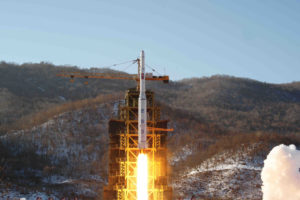by WorldTribune Staff, April 13, 2017
When South Korea obtained and turned over to international weapons analysts sections from a North Korean booster rocket that had fallen into the Yellow Sea, it was discovered that Pyongyang was getting key components for its missile program from foreign sources, mainly China.
The rocket parts, from the launch of the North’s Kwangmyongsong-4 satellite last February, demonstrated “the continuing critical importance of high-end, foreign-sourced components” Kim Jong-Un relies on in building the missiles he uses to threaten Pyongyang’s neighbors and the United States, a UN team said in a report released last month.

Implicated Chinese firms did not respond when UN officials contacted them to ask about the parts, the report said.
Chinese companies “continue to act as enablers, supplying the isolated communist regime with technology and hardware that allow its missiles to take flight,” The Washington Post reported on April 13, citing current and former U.S. and UN officials.
“The flow of products through China has allowed North Korea’s missiles engineers to achieve progress that would otherwise be difficult for an impoverished regime that is cut off from the West and lacks a sophisticated microelectronics industry.”
The foreign assistance to North Korea also includes sensitive software and other items specifically banned for export to Pyongyang under U.N. Security Council sanctions, the officials said.
China officially denies that such illegal exports exist, but “investigations show restricted products were shipped privately to North Korea as recently as 18 months ago,” the Post report said, adding it is “still unclear whether the Chinese government tacitly approved of the exports, or is simply unable or unwilling to police the thousands of Chinese companies that account for more than 80 percent of all foreign goods imported by North Korea each year.”
Chinese companies that produce materials and technology used for military systems and equipment are known to work in close coordination with the People’s Liberation Army, U.S. officials confirm.
The Unha-3, the rocket that launched North Korea’s Kwangmyongsong-4 satellite into orbit on Feb. 7, 2016, “was among the most powerful ever built” by Kim Jong-Un’s government, the Post report said. “U.S. and South Korean intelligence officials have long believed that the three-stage, 100-foot-tall rocket was designed as a forerunner for a future nuclear-tipped space vehicle that could allow North Korea to threaten cities as far away as Washington.”
North Korean engineers laced the Unha-3 with explosives so that each stage would self-destruct while falling back to Earth. South Korean navy ships, however, were able to recover enough components to allow a crude reconstruction of the entire rocket.
Investigators determined that the Unha-3’s frame was indigenously made, but “inside the rocket’s shell was an array of electronics, including specialized pressure sensors, transmitters and circuitry,” the report said. “An extensive probe by U.S. and South Korean officials revealed that many of the components had been manufactured in Western countries and shipped to North Korea by Chinese distributors” – a finding that was echoed in the UN report made public on March 9.
“The Democratic People’s Republic of Korea is flouting sanctions through trade in prohibited goods, with evasion techniques that are increasing in scale, scope and sophistication,” the UN report said.
A separate report by U.S. weapons analysts revealed that Pyongyang used Chinese middlemen to obtain access to European-made software essential for making parts for advanced rockets.
In September, Chinese authorities arrested at least 11 business executives in the border city of Dandong for allegedly selling banned goods to North Korea. Among those arrested was Ma Xiaohong, the 44-year-old founder and chairwoman of Hongxiang Group, a company accused by U.S. officials of supplying Pyongyang with rare metals and chemicals used in nuclear-weapons production.
In public comments after the Ma arrest, Chinese Foreign Ministry spokesman Lu Kang said his country would be “relentless” in enforcing sanctions aimed at ridding the Korean Peninsula of nuclear weapons. “These efforts are there for all to see,” Lu said.

